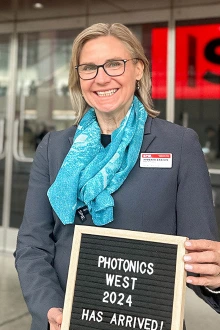Barton serving as president of global optics, photonics society
Jennifer Kehlet Barton, PhD, director of the BIO5 Institute and leader of the University of Arizona Health Sciences Sensor Lab, is serving as the 2024 president of SPIE, the international society for optics and photonics.

Jennifer Kehlet Barton, PhD
Barton was voted into the presidential chain by the society’s members in 2021, becoming vice president in 2022, president-elect in 2023 and president this year. Her elevation to the presidency underscores her leadership within SPIE, making her the seventh UArizona faculty member to hold the position.
SPIE, founded in 1955, partners with researchers, educators and industry to advance light-based research and technologies for the betterment of the human condition.
“The University of Arizona provided me the opportunity and resources to develop optical solutions for early disease detection, working with scientists and physicians,” said Barton, who is also a professor of medical imaging in the College of Medicine – Tucson and the Thomas R. Brown Distinguished Professor of Biomedical Engineering. “SPIE has brought that work to an international stage through conferences, publications and broad networking. It’s my honor to contribute to both organizations.”
Barton’s research includes the development of miniature endoscopes that seamlessly integrate multiple optical imaging techniques. Notably, her contributions to optical coherence tomography and fluorescence spectroscopy have propelled advancements in understanding light-tissue interactions for the early detection of cancer. Her research also laid the groundwork for a therapeutic laser designed to address disorders of the skin's blood vessels.
Over the years, Barton has worked closely with Tech Launch Arizona, the university unit that commercializes inventions stemming from faculty, staff and student research. She is an inventor who holds five U.S. patents and has five patent applications pending.
“UArizona Health Sciences is a tremendous partner with BIO5. Together we take scientific advancements or engineering developments and translate them to the bedside, where they can help people live healthier, longer lives,” Barton said.
Barton has been an SPIE member for more than 26 years, serving on its board of directors and various committees as well as chairing one of the society’s biggest symposiums, BiOS. Her accolades within SPIE include the SPIE President’s Award in 2016 and being named a Fellow of the society in 2008.
“As president of SPIE, I want to find more ways that all our members – from academia, industry and government – can work together for mutual benefit,” said Barton. “We need the entire community to create new photonics breakthroughs and turn them into products that help people.”
A version of this story appeared on the BIO5 Institute’s website.

